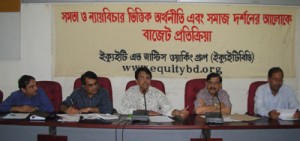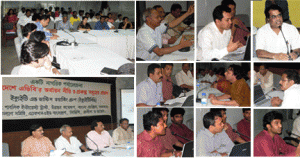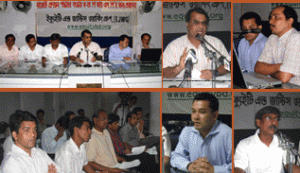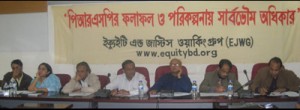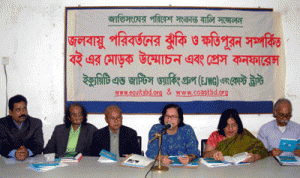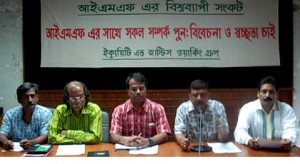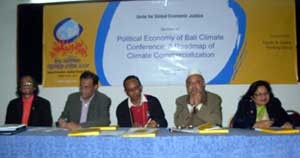 Dhaka, 31 January 2008: Equity and Justice Working Group-EJWG, in association with the Global Economic Justice Forum has organized a seminar tilted ‘Political Economy of UNFCCC climate Conference: A Roadmap of Climate Commercialization at WVA Auditorium, Dhaka. Speakers at the seminar critically reviewed the Bali climate negotiation; intended to provide an insight to the peoples, especially country’s policy makers, negotiators, on the recent dimension of mitigating climate change impacts. Md Shamsuddoha, General Secretary of the EJWG presented the key-note paper. Awami League’s ex-parliamentarian of Mr KM Jahangir, environment secretary Dr. Hasan Mahmud, BNP’s ex-parliamentarian and agricultural secretary Mr. Samsuzzaman Dudu, Communication specialist of the Climate Change Cell of the Government of Bangladesh Mr. Nasimul Haque spoke in the seminar. Leaders from country’s mainstream political parties expressed their political views and commitment for tackling the impact of climate on the people’s life and livelihoods.
Dhaka, 31 January 2008: Equity and Justice Working Group-EJWG, in association with the Global Economic Justice Forum has organized a seminar tilted ‘Political Economy of UNFCCC climate Conference: A Roadmap of Climate Commercialization at WVA Auditorium, Dhaka. Speakers at the seminar critically reviewed the Bali climate negotiation; intended to provide an insight to the peoples, especially country’s policy makers, negotiators, on the recent dimension of mitigating climate change impacts. Md Shamsuddoha, General Secretary of the EJWG presented the key-note paper. Awami League’s ex-parliamentarian of Mr KM Jahangir, environment secretary Dr. Hasan Mahmud, BNP’s ex-parliamentarian and agricultural secretary Mr. Samsuzzaman Dudu, Communication specialist of the Climate Change Cell of the Government of Bangladesh Mr. Nasimul Haque spoke in the seminar. Leaders from country’s mainstream political parties expressed their political views and commitment for tackling the impact of climate on the people’s life and livelihoods.
In the key-note paper discussion Md. Shamsuddoha pointed that the Bali Climate talks evidently proved that the industrialized countries are not ready to compromise their consumerism and development pace for the sake of global interest. In the Bali climate debate the USA and the advanced developing nations both have kept ways open for carbon emission; although the consequences of delay in the process of reducing emission will result more climatic catastrophes and social imbalances and massive economic collapse in the least developed countries like Bangladesh. In the negotiation process LDCs were within the group of G 77 and China but ‘the area of interest’ of LDCs and advanced developing countries were different. LDCs, being the majority in G 77 and China, could not put forward their concerns, e.g. emission mitigation, more adaptation fund, fund based technological support for capacity building etc as these demands contradicts with the interest of G 77 leaders. He argued that LDCs should have separate platform in relation to climate change negotiation.
Dr. Hasan Mahmud said we should put forward ‘polluter pay, exploiter pay principle’; historically rich countries are responsible for leading climate change so they should pay for this. Mr Nasimul Haque said, time is not in our hand, now climate change is not only an environmental problem, it’s a development challenge. We must reach to a political consensus for solving the climate change impact.
Mr. K.M Jahangir, in his concluding speech, said, yes we need technological support for ‘less carbon’ industrial and economic activities but we don’t want to be the victims of technology trading. Like ‘right to information’, we also should have rights on technologies.
Among others Dr. Ferdous Begum from DEBTEC, Zayed Iqbal from Bangladesh Krishok Federation, AHM Bazlur Rahman from BNNRC and Mustafa Kamal Akanda from EJWG spoke in the seminar.
Please Download [Press Release] [Position Paper] [Presentation]
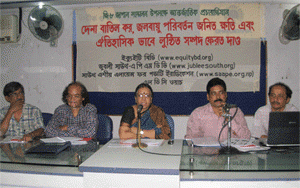 Dhaka 03 July 2008: [/B]Today Equity & Justice Working Group (Equitybd) in collaboration with Jubilee South- APMDD, SAAPE and LDC Watch has organized a press conference titled on “ Cancel Debt, Reparation and Climate Justice[/B]” at Reporter’s Unity Dhaka, VIP hall room. Former adviser of caretaker government and Executive Director- Ain O Salish Kandro, Advocate Sultana Kamal inaugurated the international Campaign by switching on the flash card on before the 34th [B]G8 summit[/B] wich will be took place in Hokkaido, Toyako, Japan 7-9th of July 2008[/B]
Dhaka 03 July 2008: [/B]Today Equity & Justice Working Group (Equitybd) in collaboration with Jubilee South- APMDD, SAAPE and LDC Watch has organized a press conference titled on “ Cancel Debt, Reparation and Climate Justice[/B]” at Reporter’s Unity Dhaka, VIP hall room. Former adviser of caretaker government and Executive Director- Ain O Salish Kandro, Advocate Sultana Kamal inaugurated the international Campaign by switching on the flash card on before the 34th [B]G8 summit[/B] wich will be took place in Hokkaido, Toyako, Japan 7-9th of July 2008[/B]

